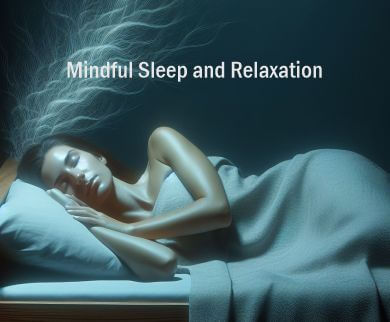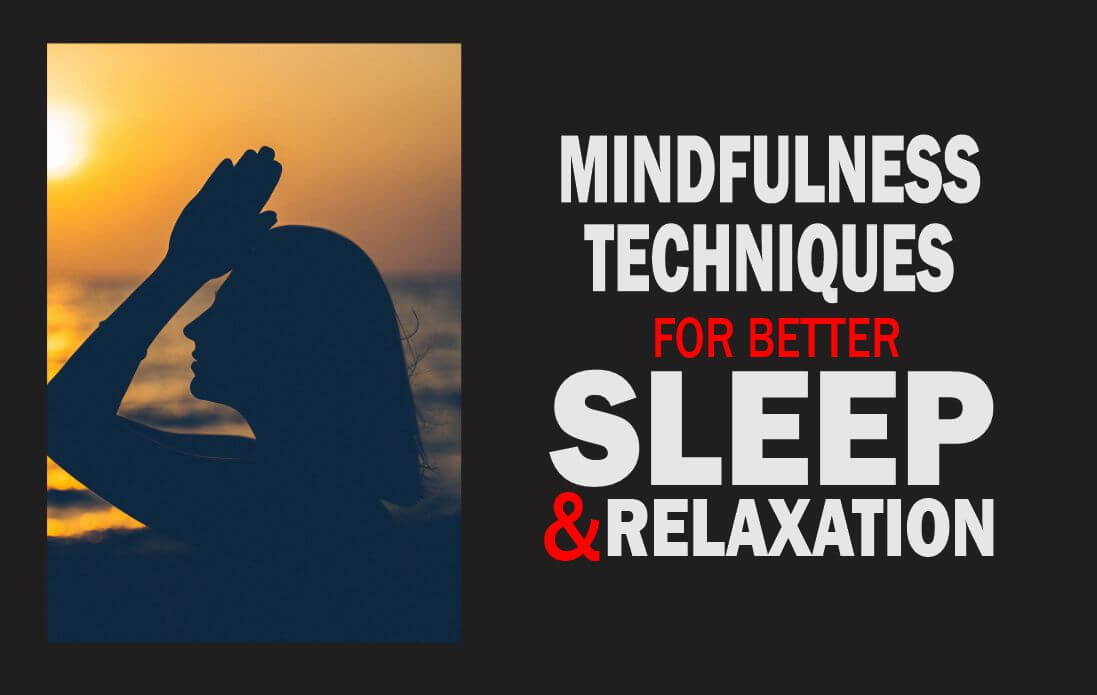Last updated on June 5th, 2025 at 04:58 pm
Discover mindfulness techniques for better sleep and relaxation to embrace tranquility, and improve sleep quality, with these expert strategies.
Better sleep and relaxation often take a backseat to the demands of the hustle and bustle of daily life. However, there is respite.
With so much to do and so little time, it’s no wonder that many of us struggle to get a good night’s sleep or find time to relax.
We find ourselves constantly juggling deadlines, responsibilities, and the never-ending stream of notifications that infiltrate our digital existence.
As a result, we suffer from the detrimental effects of poor sleep and heightened stress levels, which can negatively impact our overall well-being.
But what if there was a simple solution that could help you sleep better and feel more relaxed?
In this article, we will explore the connection between mindfulness and better sleep, as well as relaxation.
We will discuss the science behind sleep, uncover the challenges that hinder our rest, and unveil a collection of mindfulness practices specifically designed to enhance the quality of our slumber and relaxation.
Suggested: Mindfulness Activities for Adults
Table of Contents
- What are Mindfulness Techniques for Better Sleep?
- Understanding Sleep and Relaxation
- Benefits of Sleep
- Benefits of Incorporating Mindfulness into Sleep and Relaxation Routines
- Impact of Stress and Anxiety on Sleep Quality and Relaxation
- Common Challenges in Achieving Restful Sleep and Deep Relaxation
- Mindfulness-based Approaches for Addressing Sleep and Relaxation Difficulties
- Establishing a Mindful Sleep Routine
- Mindful Pre-sleep Rituals for Winding Down
- Other Lifestyle Factors for Enhanced Sleep and Relaxation
- Frequently Asked Questions
- Conclusion
What are Mindfulness Techniques for Better Sleep?

Mindfulness techniques for better sleep are a powerful practice that holds the key to unlocking restful nights and deep relaxation.
Mindfulness practice, rooted in ancient wisdom, has gained widespread recognition as a transformative tool for cultivating awareness and tranquility in our hectic lives.
By embracing mindfulness, we can reclaim control over our sleep and relaxation routines, experiencing the rejuvenating benefits they provide.
Related: Examples of Physical Self-care
Understanding Sleep and Relaxation
Sleep and relaxation are vital components of our well-being, serving as the foundation for a healthy and fulfilling life.
Yet, in our fast-paced and stress-laden world, achieving restful sleep and deep relaxation can be challenging.
By understanding the science behind sleep and relaxation, we can embark on a journey to reclaim our tranquility and rejuvenate our bodies and minds.
We will find out under the following subtopics:
The Science Behind Sleep
You wake up feeling refreshed and energized after a good night’s sleep.
Your mind is clear, your body feels rested, and you’re ready to take on the day.
But have you ever wondered what happens in your body while you sleep?
Sleep is a complex process that involves many different parts of the brain and body.
It’s not just a time when your body shuts down, but rather a time when your brain and body are actively working to repair and restore themselves.
During sleep, your brain goes through different stages of sleep, each with its unique characteristics.
These stages are known as non-REM (NREM) and REM sleep.
The sleep stage known as NREM (non-rapid eye movement) is characterized by three distinct stages, each of which deepens gradually during sleep.
On the other hand, REM (rapid eye movement) sleep is distinguished by the presence of rapid eye movements and the occurrence of vivid dreams.
Related: Introduction to the Art of Life Mastery
Benefits of Sleep

Sleep has many benefits for our physical and mental health as lack of it will deteriorate our health in no time.
Here are some of the benefits of sleep:
1. Repair and Restoration: Healing from Within
Sleep facilitates repair and restoration, promoting tissue repair, muscle growth, and immune system strengthening through biological processes and the release of growth hormones, regulating hormone levels for balanced bodily functions.
The immune system is revitalized during sleep, bolstering its ability to fight off infections and diseases.
By providing the necessary time and resources for repair and restoration, sleep plays a vital role in optimizing our physical health and promoting overall well-being.
2. Memory and Learning: The Sleep-Learning Connection
Sleep is essential for memory and learning, as it aids in memory consolidation during slumber, strengthening your ability to retain and recall information.
It also enhances problem-solving skills and promotes creativity, ultimately optimizing cognitive functions.
3. Emotional Resilience: Nurturing Your Mental Health
Sleep plays a vital role in nurturing our mental health and emotional resilience.
Quality sleep regulates emotions by processing and stabilizing them, aiding in stress management.
Insufficient sleep heightens emotional reactivity.
Prioritizing rest enhances emotional resilience, encouraging better mental health and coping abilities.
4. The Energy Connection: Fueling Your Vitality
Sleep serves as a crucial connection to fueling our vitality and sustaining our energy levels.
Quality sleep allows our bodies to recharge and restore energy reserves, ensuring optimal physical performance and cognitive function during waking hours.
Adequate sleep promotes efficient metabolism, hormone regulation, and cellular repair, all of which contribute to sustained energy production.
Sleep deprivation causes fatigue, reduced motivation, and productivity.
Prioritizing rest replenishes energy, and boosts focus, concentration, and stamina, leading to vitality and zest for life.
Benefits of Incorporating Mindfulness into Sleep and Relaxation Routines

Incorporating mindfulness techniques for better sleep into your sleep and relaxation routines can bring a multitude of benefits to your overall well-being.
Let’s explore the key advantages of integrating mindfulness practices into your quest for restful sleep and deep relaxation:
1. Stress Reduction
Mindfulness techniques for better help alleviate stress by focusing your attention on the present moment, reducing the impact of worries and anxieties that may disrupt sleep.
By cultivating a non-judgmental awareness of your thoughts and emotions, you can let go of stress and create a calmer mental state conducive to relaxation.
2. Improved Sleep Quality
Practicing mindfulness techniques for better sleep before bedtime has been shown to enhance sleep quality.
By quieting the mind and releasing tension in the body, mindfulness promotes a smoother transition into sleep, reduces the frequency of waking up during the night, and enhances the overall duration of restful sleep.
3. Enhanced Relaxation Response
Mindfulness techniques better trigger the relaxation response, a state of deep rest that counters the effects of stress and promotes a sense of calmness.
By engaging in mindfulness practices, such as deep breathing or body scan meditation, you activate the body’s natural relaxation mechanisms, leading to a more profound state of relaxation.
4. Emotional Regulation
Mindfulness techniques empower you to develop emotional resilience and regulate your emotions effectively.
By observing and accepting your emotions without judgment, you can cultivate a balanced and stable emotional state.
This emotional regulation helps alleviate the negative impact of emotional distress on sleep, allowing for a more tranquil and peaceful sleep environment.
5. Increased Self-Awareness
Mindfulness fosters self-awareness, allowing you to become attuned to your body’s signals and needs.
This heightened self-awareness helps you identify and address factors that may hinder sleep, such as poor sleep habits or environmental disturbances.
By making conscious choices and adjustments based on self-awareness, you can optimize your sleep and relaxation routines.
6. Mind-body Connection
Incorporating mindfulness practices strengthens the connection between your mind and body.
By bringing your attention to physical sensations and movements, you deepen your awareness of the body’s state, enabling you to detect and address any physical discomfort that may impact sleep.
This mind-body connection promotes a sense of harmony, supporting restful sleep and deep relaxation.
Impact of Stress and Anxiety on Sleep Quality and Relaxation

Modern life brings stress and anxiety, affecting sleep and relaxation.
Understanding their impact on sleep quality and relaxation is crucial for addressing their effects on well-being.
Let’s take a closer look at the impacts of stress and anxiety on sleep quality:
1. Disrupted Sleep Patterns: The Vicious Cycle
Stress and anxiety disrupt sleep, causing difficulties in falling and staying asleep.
Racing thoughts and worries prolong sleep onset.
Stress hormones like cortisol interfere with natural sleep cycles, perpetuating a cycle of sleeplessness and mental distress.
Mindfulness techniques are crucial for managing sleep in such situations.
Related: What Are The Seven Pillars Of Mindfulness?
2. Reduced Sleep Quality: The Elusive Rest
Even if you manage to fall asleep, stress and anxiety can impact the quality of your sleep.
You may experience fragmented sleep, characterized by frequent awakenings throughout the night.
These disruptions prevent you from reaching the deeper, more restorative stages of sleep, leaving you feeling fatigued and unrefreshed upon waking.
Stress and anxiety can also lead to vivid dreams or nightmares, causing further disturbances and contributing to a lack of rejuvenating rest.
3. Heightened Arousal and Tension: Unraveling Relaxation
Relaxation is elusive when stress and anxiety are running high.
These emotional states keep our bodies in a heightened state of arousal, preventing us from fully unwinding and reaching a state of deep relaxation.
Muscles remain tense, the mind races with worry, and the body’s stress response remains on high alert.
As a result, achieving a sense of calmness, tranquility, and true relaxation becomes a challenging feat, giving credence to mindfulness techniques for better sleep.
4. Overactive Mind and Rumination: Racing Thoughts at Night
Nighttime often amplifies our tendency to ruminate and dwell on stressors, anxieties, and unresolved issues.
As we lay in bed, our minds become a breeding ground for worrisome thoughts, making it nearly impossible to find peace and tranquility.
This mental hyperactivity not only disrupts sleep but also hinders our ability to relax and let go of stressors during waking hours, making mindfulness techniques for better sleep essential.
5. Exhaustion and Fatigue: The Toll on Daily Functioning
The consequences of poor sleep and the inability to relax extend beyond the nighttime hours.
Persistent stress and anxiety can leave us feeling chronically exhausted and fatigued, impacting our cognitive abilities, mood, and overall functioning during the day.
Concentration, memory, decision-making, and productivity may suffer, affecting our performance at work, relationships, and overall quality of life.
And this is why we have to incorporate mindfulness techniques for better sleep in our daily routine.
Related: Mindfulness Techniques for Pain Management
Common Challenges in Achieving Restful Sleep and Deep Relaxation

Achieving restful sleep and deep relaxation can be quite an endeavour.
You may find yourself facing a slew of common challenges that stand in your way.
Let’s shed some light on these obstacles that often hinder your path to tranquility, and uncover strategies for mindfulness techniques for better sleep.
1. Racing Thoughts
Your mind, oh how it races! When you lay down to rest, thoughts sprint through your head like a marathon.
It seems your brain has an unending to-do list. Fear not, for there are techniques to calm the storm.
Try journaling or practicing mindfulness to tame the whirlwind of thoughts and guide your mind into a serene state.
2. Restless Body
Ah, the restless legs and twitching muscles that disrupt your peace. Just as you’re ready to drift off, your body decides it’s time to groove.
But worry not, my friend. Incorporate relaxation exercises like progressive muscle relaxation or gentle stretching into your bedtime routine.
They can soothe those restless sensations and prepare your body for a tranquil slumber.
3. External Distractions
Oh, the never-ending distractions that invade your sleep oasis!
From buzzing notifications to the city’s nocturnal symphony seeping through your windows, achieving a serene sleep environment can feel like a battle.
Invest in earplugs, and blackout curtains, and establish boundaries with your digital devices.
Reclaim the tranquility you deserve.
4. Time Demands and Busy Schedules
The hustle and bustle of life can leave little room for rest, can’t it? It often feels like the hours in a day are never sufficient.
But remember, self-care is not a luxury – it’s a necessity. Carve out time for yourself, prioritize sleep, and establish a consistent bedtime routine.
Make restful slumber an unwavering part of your busy schedule.
5. Stress and Anxiety
The burdens you carry on your shoulders. Stress and anxiety wrap around you like a suffocating blanket, making peace and relaxation elusive.
But worry not, my friend, for there are ways to manage and reduce stress.
Explore mindfulness practices, engage in deep breathing exercises, or seek support from therapists or support groups.
Release the weight of stress and pave the way for restful sleep and deep relaxation.
Related: How Can Mindfulness Help In The Workplace?
Mindfulness-based Approaches for Addressing Sleep and Relaxation Difficulties

Mindfulness, the art of being fully present in the present moment, holds a connection to sleep and relaxation.
Mindfulness encourages awareness of thoughts, emotions, and bodily sensations, reducing stress and sleep disturbances.
Techniques like deep breathing induce relaxation, promoting tranquility.
Integrating mindfulness into bedtime rituals enhances sleep quality, leading to rejuvenation and inner calm, unlocking the benefits of restorative sleep and relaxation.
Here are various mindfulness techniques for sleep and relaxation.
1. Mindful Breathing Exercises
Mindful breathing is a simple yet powerful technique. By directing attention to the breath, we ground ourselves in the present, calming mind and body.
Deep diaphragmatic breathing activates relaxation, easing stress and anxiety, and promoting restful sleep.
2. Body Scan Meditation
Body scan meditation guides attention through the body, from head to toe.
Awareness of sensations helps identify tension or discomfort.
Without judgment, releasing tension promotes relaxation, aiding sleep.
This practice alleviates physical tension, promoting a calm state of sleep.
3. Progressive Muscle Relaxation
Progressive muscle relaxation involves sequentially tensing and relaxing various muscle groups in the body.
Starting from your toes and working your way up to your head, tense each muscle group for a few seconds before releasing the tension and feeling a deep relaxation that follows.
This technique helps release physical tension, calms the nervous system, and prepares both the mind and body for a more peaceful sleep.
4. Mindful Visualization Techniques
Engaging in mindful visualization techniques allows you to create a mental sanctuary that promotes relaxation and sleep.
Close your eyes and imagine a peaceful and serene place, such as a tranquil beach or a calming forest.
Visualize the details, sights, sounds, and sensations of this place, immersing yourself fully in the experience.
This visualization practice helps to shift your focus away from stressors and cultivates a state of relaxation and tranquility.
5. Mindful Movement Practices (e.g., Yoga, Tai Chi)
Mindful movement practices like yoga and tai chi offer holistic sleep benefits.
Combining gentle movements, breath awareness, and mindfulness, they unwind the body and mind, reducing tension.
These practices activate relaxation responses, improving sleep quality.
They enhance body awareness, alleviate discomfort, and promote a deeper mind-body connection, promoting rejuvenating sleep.
Establishing a Mindful Sleep Routine
Creating a mindful sleep routine is crucial for well-being.
Integrating mindfulness into sleep rituals creates a nurturing environment for restful nights and serene mornings.
Master key elements such as setting up a conducive sleep environment, winding down with pre-sleep rituals, and incorporating mindfulness into morning routines.
Let’s take a closer look at all of that and more:
1. Decluttering the Bedroom
Clearing out clutter from your bedroom creates a sense of tranquility and promotes better sleep and relaxation.
Remove any unnecessary items, organize your space, and create a clutter-free zone that helps declutter the mind as well.
2. Optimizing Lighting and Noise Levels
Ensure that your bedroom is dark and quiet during sleep time.
Use blackout curtains or blinds to block out external light sources, and consider using earplugs or a white noise machine to minimize disruptive noises.
Creating a peaceful and quiet environment helps create the conditions for restful sleep.
3. Using Calming Scents or Essential Oils
Certain scents, such as lavender, chamomile, or ylang-ylang, have relaxing properties that can aid in sleep.
Consider using a diffuser or linen spray to infuse your bedroom with soothing aromas.
These calming scents can help induce a sense of tranquility and prepare your mind and body for sleep.
Mindful Pre-sleep Rituals for Winding Down

Incorporating mindful pre-sleep rituals into your bedtime routine is a powerful strategy for establishing a mindful sleep routine.
By intentionally engaging in activities that promote relaxation and calmness, you signal to your mind and body that it’s time to unwind and prepare for a restful night’s sleep.
Let’s take a closer shot:
1. Digital Detox and Screen Time Reduction
The blue light emitted by electronic devices can disrupt your sleep-wake cycle.
Prioritize a digital detox by disconnecting from screens at least an hour before bedtime.
Instead, engage in screen-free activities that promote relaxation, such as reading a book or engaging in gentle stretching exercises.
2. Relaxing Activities Before Bed
Engage in activities that promote relaxation and quieten the mind.
Reading a book, listening to calming music or a guided meditation, taking a warm bath, or practicing gentle yoga or stretching can help transition your mind and body into a state of relaxation, preparing you for a restful sleep.
3. Journaling or Gratitude Practice
Take a few moments to reflect on your day through journaling or gratitude practice.
Write down any thoughts, worries, or reflections that may be on your mind.
Expressing gratitude for the positive aspects of your day can shift your focus towards a more positive mindset, reducing anxiety and promoting a sense of peace before sleep.
Other Lifestyle Factors for Enhanced Sleep and Relaxation

Achieving optimal sleep and relaxation extends beyond mindfulness practices alone.
Other lifestyle factors also play a role in encouraging a restful and rejuvenating experience.
Let’s check them out:
1. Healthy Sleep Hygiene Practices
Maintaining consistent sleep schedules, even on weekends, helps regulate your body’s internal clock and promotes better sleep quality.
Additionally, avoiding stimulants like caffeine and electronic devices close to bedtime supports the body’s natural wind-down process, enabling you to fall asleep more easily and experience deeper rest.
2. Regular Exercise and its Positive Impact on Sleep Quality
Engaging in regular physical exercise has been linked to improved sleep quality.
Physical activity helps regulate sleep patterns, reduces stress, and enhances overall well-being.
Aim for at least 30 minutes of moderate exercise most days of the week, but avoid intense workouts close to bedtime as they may have an energizing effect.
3. Balanced Diet and Mindful Eating Habits
What you eat and how you eat can influence your sleep and relaxation.
Adopting a balanced diet that includes whole foods, lean proteins, fruits, vegetables, and whole grains provides essential nutrients for optimal functioning.
Practice mindful eating by savoring each bite, paying attention to hunger and fullness cues, and avoiding heavy meals close to bedtime to prevent discomfort and promote peaceful sleep.
4. Creating Boundaries between Work and Personal Life for Better Relaxation
Establishing boundaries between work and personal life is vital for relaxation.
Set clear work hours, designate a workspace separate from your relaxation areas, and limit after-work communications to create a sense of separation.
Engaging in activities you enjoy, spending quality time with loved ones, and pursuing hobbies or leisurely pursuits outside of work contribute to a more balanced and fulfilling life, enhancing relaxation.
Frequently Asked Questions
How can mindfulness improve sleep?
Mindfulness improves sleep by calming the mind, reducing stress, and promoting relaxation, leading to easier sleep onset, deeper sleep, and fewer sleep disturbances.
What is mindfulness relaxation technique?
Mindfulness relaxation techniques involve focusing attention on the present moment, observing thoughts and sensations without judgment, and consciously relaxing the body.
What is mindfulness in sleep?
Mindfulness in sleep entails integrating mindfulness practices into bedtime routines, such as deep breathing, body scans, or mindful meditation, to enhance relaxation and promote restful sleep.
How do you meditate to relax and sleep?
To meditate for relaxation and sleep, focus on deep breathing, observe sensations in the body, let go of intrusive thoughts, and cultivate a sense of calmness and tranquility.
Conclusion
Prioritizing sleep and relaxation is essential for your overall well-being.
We have explored the significance of these practices in nurturing physical, mental, and emotional health.
Mindfulness emerges as a powerful tool that can positively impact your sleep and relaxation routines.
By practicing mindfulness techniques for better sleep such as mindful breathing, body scan meditation, and mindful movement, you can cultivate a sense of calm, reduce stress, and create an environment conducive to restful sleep.
References:
- The Ultimate Guide to Mindfulness for Sleep
- Mindfulness Exercises To Help You Sleep
- 6 Mindfulness and relaxation techniques for sleep
- Waking Up in the Night? Try These 5 Mindfulness Exercises
Pyo Merez (PsyD) is a distinguished adolescent and adult psychologist at the forefront of mental health advocacy.
With expertise in cognitive and developmental psychology, focusing on social relationships, cultural contexts, and individual differences, Pyo has dedicated his career to empowering adolescents and adults.
As a sought-after speaker and panelist, Pyo shares invaluable insights on issues affecting young people, contributing to a deeper understanding of mental health and well-being in today's society.


